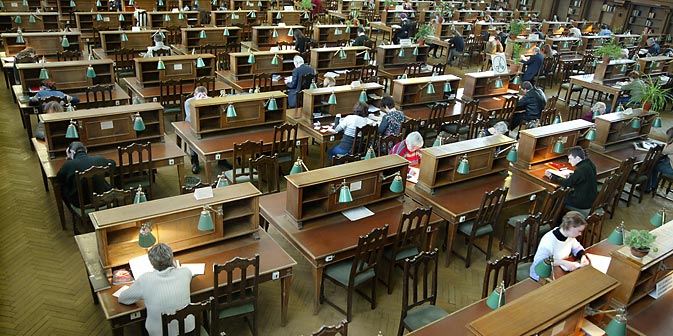Russia acquires the world's leading scientific archives

The Russian State Library, formally known as the Lenin Library. Source: ITAR-TASS
The full archives of the world's renowned scientific journals, Science and Nature, as well as journals published by Taylor & Francis Group, Cambridge University Press, Institute of Physics, Annual Reviews, Sage Publications, and Oxford University Press have been purchased by the Russian Ministry of Education and Science for the country's scientific and educational community.
Each archive contains the full texts of all content from the very first issue of the very first journal.
The news was first announced by the National Electronic Information Consortium (NEICON), to the pleasure of all scientists and researchers — past and present — who have any connection with Russia. According to statistics, one out of every three or four queries made by the scientific community relates to articles in these archives. In the field of social sciences and humanities, the citation frequency rises to 50 percent.
As noted by Mikhail Alfimov, scholar and director of the Center of Photochemistry, all of the information required to produce carbon-based nanotubes over the next 5-10 years lies in these databases. In other words, the archives of the leading foreign scientific publications are not just in demand, but they also form a basis and intellectual framework for modern scientists.
All in all, the scientific archives of the world's leading publishers represent the most comprehensive and fundamental insight into the development of science over the last 200 years. It is no accident that the digitized archives have already been purchased by many Western European and BRICS countries.
As explained by Andrei Petrov, head of the Directorate of Scientific and Technical Programs under the Russian Ministry of Education and Science, a list of archives was drawn up by experts at the Russian Institute of Scientific and Technical Information (VINITI RAN), research institutions, universities, and leading libraries. The chief task was to select the publishers that carry the most weight within the global scientific community and were willing to provide their archives to practically the entire country.
The project was conceived and implemented under a government contract with the Ministry of Education and Science, as part of the national target program entitled "Research and development in the priority areas of Russia's scientific and technological complex for 2007-2013."
"The government contract, which was signed by the consortium for a period of three years (2011-2013), is worth a total of 990 million rubles ($32 million)," said Alexander Kuznetsov, executive director of NEICON . "The purchase price of the archival resources makes up about 70 percent of this sum. Financing comes at regular intervals, in the form of six payments."
Russia will create two technology platforms that will host the archive and provide researchers with access to the information from anywhere in the country. The main body of the archive is already available on the experimental website, as well as on the websites of the relevant publications via www.neicon.ru.
The National Electronic Information Consortium was established in 2002 as a nonprofit partnership. Its main objective is to promote and improve the international status of Russian science, education, and culture, through the provision of high-quality and authoritative scientific information in electronic format. As of today, the partnership includes more than 780 organizations from 120 towns and cities across Russia. Participants in the consortium include Moscow State University and St. Petersburg State University, all federal universities, and the majority of Russia's research universities.
First published in Russian in Rossiyskaya Gazeta.
All rights reserved by Rossiyskaya Gazeta.
Subscribe
to our newsletter!
Get the week's best stories straight to your inbox